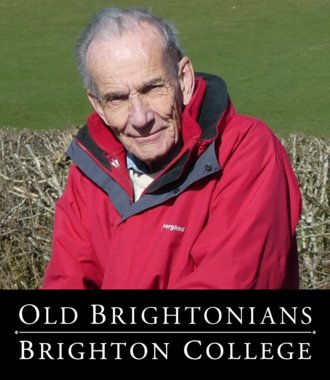
Avril Rowlands writes:
Chris started at Brighton College in September 1957 when he was thirteen years old. He was a day boy in Aldrich House. He left in 1963 when he was nineteen.
Chris had two great interests in his life, one of which was reflected in his choice of career. Passionate about film, when he was fourteen, he and a few school friends borrowed a 16mm clockwork Bolex camera and made a film about the closing of the nearby Horsham railway line. The rolls of film arrived on his doorstep and Chris realised that they made no sense. Getting an advance on his pocket money he bought a film splicer and edited them into the correct order. That was the start of his editing career. His other passion was for steam railways.
At school, Chris was involved with the Royal Air Force Air Cadet group and learned to fly a glider, but his real interest was centred round the School’s Film Society. Under their auspices he made a film of the visit to the school in 1962 of Queen Elizabeth II. The Reverend Bill Peters was school chaplain during the time Chris was there and had a great influence on his life.
On leaving school Chris tried to get into the feature film industry, but that time it was very much a closed shop and as he didn’t have any family to pave the way, for a short while he worked as an assistant editor at ‘Religious Films’, which had been set up by the Methodist peer, Lord Rank. His job was largely travelling round churches explaining to clergy how to set up and run 16mm projectors. He did not get much experience in the cutting room.
In his spare time Chris and other Brightonians, Peter Hall and John Parsons, formed themselves into Tripos Productions. Nigel Hastings was co-opted later. They made an award winning film ‘Cathedral of Sussex’ about the restoration of Chichester Cathedral, and a film, 'Expo Sussex 1968’.
In 1965, at the age of twentyone, Chris began his career at the BBC, a career which spanned over 50 years. Initially editing film inserts for programmes such as ‘Play School’ , ‘Horizon’, ‘Dr Finlay’s Casebook’, and ‘Dr Who’, he then began working on ’24 Hours’ – now ‘Newsnight’ and then progressed to his real love, drama.
Chris and I met in 1972 when we both worked on a children’s drama series, ‘Fish’. I was doing the job of continuity. Not surprisingly, most of our dates included visits to the cinema. Chris at that time was editing the renowned director, Mike Leigh’s first film for television, ‘Hard Labour’.
We were married in 1973 and worked together on a number of children’s drama series. It was only when I was working on a children’s drama, ‘Carrie’s War’ and was given a ride on the footplate of the engine that I realised that his other passion was steam. Wanting to make a film together we spent most weekends travelling up from London to the Severn Valley Railway to make ‘Steam-upon-Severn’ – which was later transmitted by BBC Midlands.
Knowing that there was a thriving drama department at Pebble Mill, we moved from London in 1978. Chris worked on a variety of programmes – some in the Play for Today series. He also edited episodes of ‘Dangerfield’; Dalziel & Pascoe’; inserts for ‘All Creatures Great and Small’. He ended his career at the BBC as Supervising Editor for all the drama at Pebble Mill and was instrumental in ensuring that the long-running soap ‘Doctors’ got on the air.
At a time when there was a certain amount of hostility between film and videotape editors, Chris was in the forefront of transitioning film to tape to digital. Creative editing, he felt, was creative editing, whether working with the tools of film or Sony U-Matic or digital.
Chris had two stints of directing: on the children’s series ‘Jackanory’ and ‘Blue Peter’. When offered a job on ‘Blue Peter’, the series producer, Biddy Baxter said she was sure Chris would turn it down. He did. Later, Chris was approached to see if he would be interested in the new post of Post Production Manager at Pebble Mill. He wasn’t. His over-riding and life-long love was for editing.
The three programmes Chris edited which meant the most to him were two episodes of the documentary series ‘Royal Heritage’, where, apart from editing, he spent a fascinating day sitting in Queen Victoria’s coach in the York Railway Museum with Sir Huw Weldon who fronted the series, discussing the Queen’s involvement in railways; ‘Parnell and the Englishwoman’, transmitted in 1991, which was a series set in the 19th century about Charles Stewart Parnell’s love affair with Kittie O’Shea. And lastly, the eight-part children’s television drama series I wrote, ‘God’s Wonderful Railway’. (By this time I was pursuing a career as a writer and also running training courses in television production.)
Chris was editing pretty well until the end of his life. When the churches were closed during the pandemic, we began a short midweek reflection on a reading from the Bible. Members of the clergy and I contributed and Chris edited them all.
Chris enriched the lives of so many, both personally, as well as those watching the programmes he edited. He was kind and loving and always put himself out to help others, being instrumental in aiding many new to the profession. Qualities, I’m sure, which were nurtured by his time at Brighton College.
Perhaps I’m biased, but I felt he was a sublimely creative editor and I was immensely proud that so many of his former colleagues attended his funeral which was a joyous celebration of his life beginning with his coffin being towed through the village by a steam traction engine!
He will be missed by very many.
